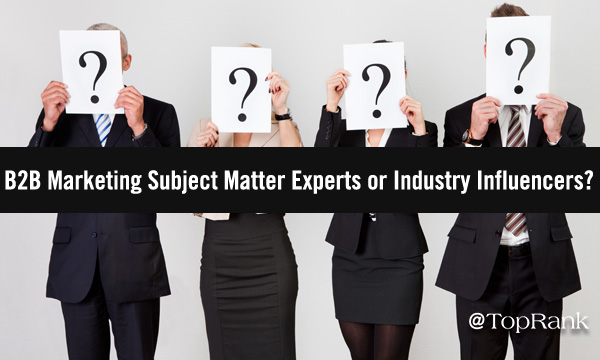B2B Marketing Subject Matter Experts & Industry Influencers: Which Should I Choose?


What does being an influencer really mean in the B2B world?
The classic B2C influencer is someone with a big following on social media, someone who makes a living doing makeup tutorials or cosplay or skateboarding tricks. Brands who want to reach their audience can simply provide free products or sponsor a post — it’s inherently transactional.
But for B2B, the question is a little trickier. B2B influencers are very rarely celebrities with millions of followers. For example, given enough time and money, you could get Taylor Swift to endorse your hybrid cloud solution. But would her endorsement really persuade your audience?
You can’t judge influence in B2B by follower counts alone. There are multiple ways that people can be influential in the B2B space. Which type of influencer your project needs will vary depending on your goals.
Let’s take a look at two different types of B2B influencer: The Subject Matter Expert and the Industry Influencer.
Subject Matter Experts Vs. Industry Influencers for B2B Marketing
Which is better for your project: A thousand impressions or a single multi-million-dollar click? There’s no right answer for every situation, of course, and the answer may very well be “both.” But the point is to ask the question when your project is in the planning stages.
We can start by defining each of these influencer types, and then we can dig into how to choose the right influencers for your content.
Who Is a Subject Matter Expert?
A subject matter expert (SME) could mean anyone who knows a lot about one particular subject. In influencer marketing, though, it means something slightly different: It’s someone who has that knowledge, and may be influential in business circles, but also has a small social media footprint.
SMEs can include practitioners in a particular field, executives of successful businesses in your target industry, or even your own employees. They may not have the reach of an industry influencer, but they do have knowledge that your target audience will find valuable. What’s more, they’re a credible source, because they’re right down in the trenches with your audience.
The challenge of working with an SME for creating content is that they may not be used to speaking to an audience. While an industry influencer can whip up a 500-word blog post in their sleep, an SME will take more time and encouragement before they’re ready to contribute.
If your goal is to maximize awareness with top-of-funnel content, you wouldn’t go with SMEs exclusively. For content further down the funnel, with a highly-targeted audience, however, the more SME content, the better.
Who Is an Industry Influencer?
Let me say, first, that an industry influencer is no less knowledgeable than an SME. But the work of an industry influencer includes building an audience and actively pursuing thought leadership status. They’re keynote speakers, authors, and podcast hosts. They are more likely to be analysts and consultants than active practitioners.
There are several advantages to working with industry influencers, beyond the obvious broader reach: They already know how to quickly create content and package it for their audience. They know the value of self-promotion and can see when it’s mutually beneficial to create content with your brand. And they can have a broader perspective of the industry, gleaned from analyzing trends and/or consulting with multiple businesses.
Industry influencers are perfect for top and middle-funnel content. But they are less likely to get into the specifics of day-to-day operations, while an SME would be equipped to give those practical details that make lower-funnel content work.
What Type of Influence Does Your B2B Marketing Need?
Which influencer is right for you? As I said, you might want more SMEs in a lower-funnel piece and more industry influencers in top-of-funnel content. But really, the answer is that a healthy mix of influencers tends to get the best results.
Industry influencers bring reach, polish and thought leadership. SMEs bring a practitioner’s experience and credibility. The two can complement each other to make your content irresistible to your audience.
For example, our client monday.com created content with SMEs and industry influencers for their remote work campaign. By combining the strengths of different types of influence, the campaign achieved 1,790% of its projected goal for social reach.
Create an Influencer Community
Here’s one more way that B2B influencer marketing is different from B2C. While B2C agreements tend to be one-off and transactional, B2B influence is about building relationships and forming a community. Instead of contracting with an influencer for a single project, it’s important to keep in contact. Make sure your influencers know each other and facilitate conversations. Help them network, teach, and learn from each other.
When you take an always-on approach to influencer marketing, you can create a trusted group of go-to experts, folks who are loyal to your brand and ready to collaborate on an ongoing basis.
And that’s far more valuable than a Taylor Swift retweet.
What’s working, what isn’t, and what’s next for B2B influencer marketing? Find out what your peers had to say in our 2020 State of B2B Influencer Marketing report.
The post B2B Marketing Subject Matter Experts & Industry Influencers: Which Should I Choose? appeared first on Online Marketing Blog – TopRank®.